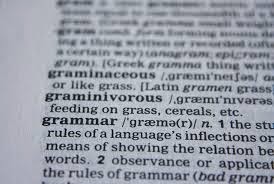What is a subject verb agreement?
In previous posts we've looked at Nouns, verbs and subjects. Please see below for links to past posts.
Now we're going to delve deeper into the mind field of grammar rules and look at subject - verb agreements.
What is a subject - verb agreement?
A subject - verb agreement stipulates that the subjects and verbs within a sentence must agree with one another in number.
The fundamental rule of the subject- verb agreement is that if a subject is singular then its verb must be singular. If a subject is plural then its verb must be plural.
When used in the present tense, a singular noun adds an S to the singular verb.
The witch chases the wizard.
In this sentence the noun, witch is singular and therefore adds an S to the verb chases.
The witches chase the wizard.
In this sentence the noun, witches, is plural, therefore there is no S added to the verb chase.
Simple so far.
However this is not the end. This is just the beginning. There are many, many rules to the subject verb agreement!
The biscuit walked away.
In this sentence the subject, biscuit, is singular
The biscuits walked away.
In this sentence the subject, biscuits, is plural.
If you need to remind yourself what a helping verb is, this link will provide all the answers.
What are linking verbs, phrasal verbs and helping verbs?
The biscuit , which is really crunchy, walked away.
The subject and verb is unchanged by the description of the biscuit.
If you don't know, a prepositional phrase is a series of words that link a noun to another word in a sentence
Like a sassy catwalk model, the biscuit walked away
In this sentence the prepositional phrase like a sassy catwalk model, does not affect the subject verb agreement.
The biscuit and catwalk model are both singular subjects and their corresponding verb is, is singular.
In this sentence neither/nor are used so the verb agrees with the nearest noun/pronoun which is catwalk model.
In this sentence the plural verb is are as there are two subjects, the biscuit, the sassy catwalk model, that are connected together by and.
Related posts
What are compound nouns, common nouns and proper nouns?
What are linking verbs, phrasal verbs and helping verbs?
What's a subject, and an infinitive within a sentence?
Help for writers
Top writing tips for new authors
How to develop a basic story plot
How to stay focused when starting out as a new writer.
Book reviews
The Prince of thorns, by Mark Lawrence
The curious tale of Jonathan Strange and Mr Norrell, by Susanna Clarke
Now we're going to delve deeper into the mind field of grammar rules and look at subject - verb agreements.
What is a subject - verb agreement?
A subject - verb agreement stipulates that the subjects and verbs within a sentence must agree with one another in number.
The fundamental rule of the subject- verb agreement is that if a subject is singular then its verb must be singular. If a subject is plural then its verb must be plural.
When used in the present tense, a singular noun adds an S to the singular verb.
The witch chases the wizard.
In this sentence the noun, witch is singular and therefore adds an S to the verb chases.
The witches chase the wizard.
In this sentence the noun, witches, is plural, therefore there is no S added to the verb chase.
Simple so far.
However this is not the end. This is just the beginning. There are many, many rules to the subject verb agreement!
- The above subject verb agreement rules do not apply to verbs used in a past tense if there are no helping verbs.
The biscuit walked away.
In this sentence the subject, biscuit, is singular
The biscuits walked away.
In this sentence the subject, biscuits, is plural.
If you need to remind yourself what a helping verb is, this link will provide all the answers.
What are linking verbs, phrasal verbs and helping verbs?
- Words that come between the subject and the verb do not affect the subject verb agreement.
The biscuit , which is really crunchy, walked away.
The subject and verb is unchanged by the description of the biscuit.
- Prepositional phrases do not usually change the subject verb agreement within a sentence.
If you don't know, a prepositional phrase is a series of words that link a noun to another word in a sentence
Like a sassy catwalk model, the biscuit walked away
In this sentence the prepositional phrase like a sassy catwalk model, does not affect the subject verb agreement.
- Two singular subjects within a sentence that are connected by either/or, or, neither/nor will require a singular verb in the subject verb agreement
The biscuit and catwalk model are both singular subjects and their corresponding verb is, is singular.
- In the subject verb agreement the verb will agree with the pronoun/noun closest to it if the words either/or, or, neither/nor are used.
In this sentence neither/nor are used so the verb agrees with the nearest noun/pronoun which is catwalk model.
- Usually a plural verb will be needed when two or more subjects within a sentence are connected by and.
In this sentence the plural verb is are as there are two subjects, the biscuit, the sassy catwalk model, that are connected together by and.
Related posts
What are compound nouns, common nouns and proper nouns?
What are linking verbs, phrasal verbs and helping verbs?
What's a subject, and an infinitive within a sentence?
Help for writers
Top writing tips for new authors
How to develop a basic story plot
How to stay focused when starting out as a new writer.
Book reviews
The Prince of thorns, by Mark Lawrence
The curious tale of Jonathan Strange and Mr Norrell, by Susanna Clarke





Comments
Post a Comment